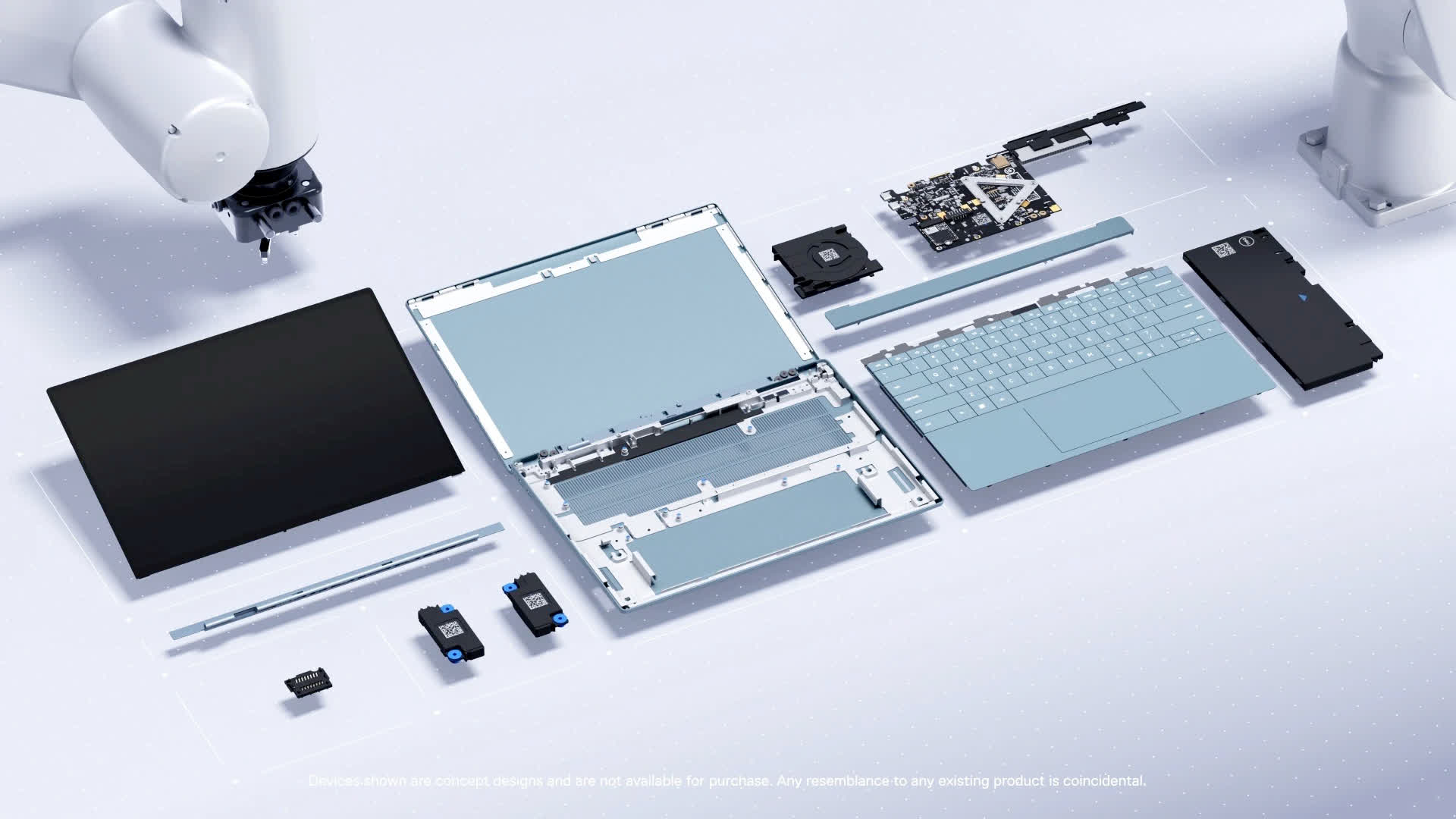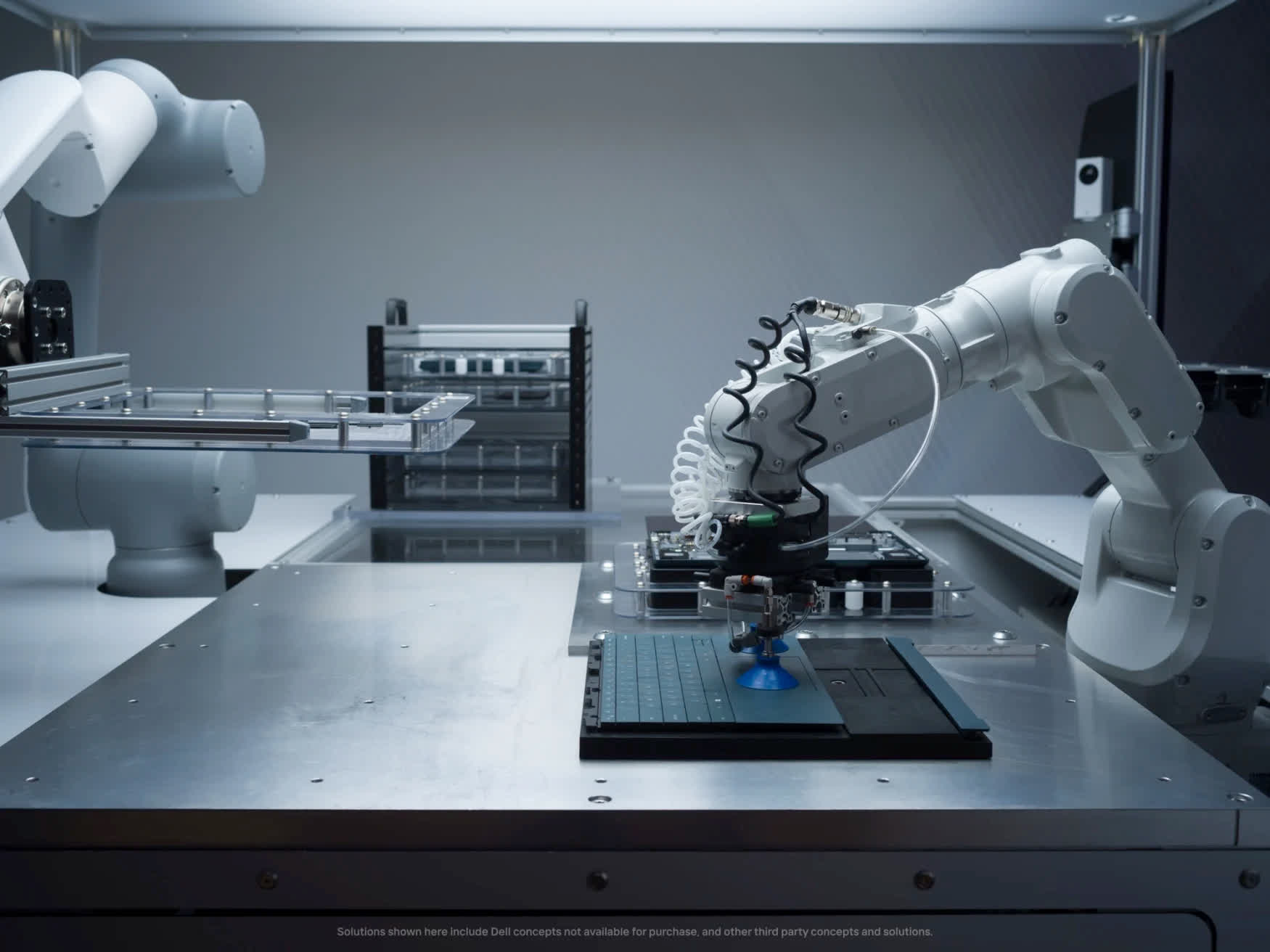Forward-looking: When Dell first unveiled the Project Luna concept, the company garnered a great deal of attention for creating a vision centered around how devices like PCs could be upgraded, repaired, and recycled. The initial Luna concept focused on the modularity of the device, highlighting how key components could be organized into elements that essentially snapped together, creating an elegant notebook design that could easily be opened and accessed to do things like replace a motherboard or screen, perform upgrades, and more.
Fast forward nearly a year after and Dell now has an upgraded Luna PC design that extends this concept to easy robotic manufacturing, component reusability, and potentially even a new circular economy-like business model.
Luna 2.0 (not the official name, but a reasonable way to think about it) refines modularity further, simplifying things like the number of screws necessary to open the device and making disassembly easier. Not only is this simplified design an important step forward in repairability and device accessibility, but it also opens new opportunities for applications like manufacturing and remanufacturing the device.
To highlight this, at a recent press event in New York, Dell had a small robotic manufacturing machine on hand to demonstrate how easily a Luna PC could be assembled, disassembled, and/or upgraded.
This represents a great opportunity to speed up the manufacturing process and reduce costs at the same time—though it would require key component suppliers to get behind the modular standards that Dell is creating for Luna (which may not be as easy as it sounds).
At the same time, it also highlights how PCs—or at least certain elements of them—could have their lifetimes significantly extended. Instead of upgrading to a whole new PC just to get the latest processor or GPU or a higher-resolution screen, for example, you could just upgrade certain components and keep using the rest.
Must read: Sustainable Computing, Explained
In addition, the components from, say, a higher-end notebook that sported the latest generation CPU could be waterfalled down to a machine that featured an even older processor, extending its useful life as well. If done on a large enough scale, this could significantly reduce the amount of waste created by PCs that are retired after just a few years use and often end up in landfills.
The modular nature of the design would also mean that individual components could be more easily recycled or refurbished, which could theoretically lead to a circular economy model, whereby older components or at least raw materials could be reused in new machines instead of being thrown away.
As great as this all sounds in theory, there are several real-world challenges. First, previous efforts with modular designs have proved to be difficult to implement and sustain in the real world. Because of the rapidly evolving nature of things like internal and external interconnects, by the time one machine is ready to be upgraded, system designs may have changed so much that it's not practical to try and upgrade them.
In addition, the desire for new form factors, new types of input devices, and other elements can also make the upgrade process difficult. Having said all this, we have arguably reached a point of maturity in laptop PCs where there haven't been a great deal of changes to mainstream clamshell designs for many years. Additionally, the universality of things like USB-C and Thunderbolt connections make some of the I/O challenges of the past much easier to handle.
In addition to the manufacturing opportunities and challenges, there are also some intriguing new business models that something like Project Luna could enable. For one, the concept of an upgradable PC as a service—where a certain number of upgrades are included/expected as part of the service price—is bound to garner attention.
Businesses and potentially even consumers are likely to find these types of options much more interesting than the lease-like financing models currently included in PC-as-a-service offerings.
With growing interest in sustainability overall, there are also opportunities to focus on how these types of PCs can help organizations reach their own sustainability goals. By doing things like quantifying the specific carbon footprint reduction metrics that a Luna PC could offer, Dell could bring a whole other level of conversation into the buying discussion. On the other hand, as a company that still makes a significant portion of its revenue from selling new PCs, figuring out how the economics will work with fewer new machine sales, but more upgrades and remanufactured PCs could be a challenge.
Dell has made it clear that Project Luna is still officially a concept, though products based on it seem increasingly likely in the next couple of years. At the end of the day, it still has to be a compelling PC that can stand up to "traditionally" designed and manufactured alternatives. Given the growing attention on how products are made, as well as how they're recycled, however, it does raise some interesting questions as to how future PC designs and PC business models continue to evolve.
Bob O'Donnell is the founder and chief analyst of TECHnalysis Research, LLC a technology consulting firm that provides strategic consulting and market research services to the technology industry and professional financial community. You can follow him on Twitter @bobodtech.
https://www.techspot.com/news/96981-dell-project-luna-concept-showcases-future-sustainable-pcs.html

